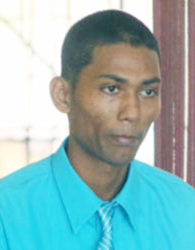Deosarran Bisnauth, the teen who was handed a life sentence by Justice Navindra Singh after being convicted for manslaughter two weeks ago, is appealing both the sentence and the conviction.
In a notice of appeal, filed by his attorney Nigel Hughes, the teen has argued that his sentence was “manifestly excessive.” Bisnauth, called “Strokes Mouth,” was initially indicted for the murder of Robert Mangal, called “Trevor,” which he allegedly committed on July 6, 2013, at Enmore, East Coast Demerara.
On April 18, a 12-member jury unanimously found the young man not guilty of murder, but by a proportion of 11 to 1 convicted him on the lesser count of manslaughter at the High Court in Georgetown.
The nineteen-year-old has listed several grounds on which he is appealing.
He has advanced that Justice Singh misdirected the jury on the law and elements of self defence and provocation.

According to Bisnauth, the judge “failed to put, or to adequately and/or fairly” put his defence to the jury.
He has argued, too, that the judge misdirected the jury on the medical evidence presented in his case.
The appellant has said too that his sentence was “manifestly excessive.”
In a plea of mitigation before the sentence was imposed, defence attorney Bernard De Santos SC, who represented Bisnauth at trial, had told the court that his client had no previous brushes with the law and was not known to be of a hostile character.
He had begged the court to consider that at the time of the killing, Bisnauth was only 16 years old, and at age 19 “is now attaining manhood.”
In this regard, De Santos had asked the judge to deal with Bisnauth in a way that would not take away his youth and requested that he be given an opportunity to contribute to society.
Prosecutor Tuanna Hardy had, however, asked the court to visit the convict with a sentence commensurate with his actions, while reminding that a life had been lost.
She made a forceful appeal for a message to be sent to society that persons are not to be taken advantage of, whether the victim is in a drunken state or not.
When he was asked by the court whether he wanted to say anything before being sentenced, Bisnauth calmly responded, “No, sir.”
The judge then informed him that his sentence would be life in prison.
During the trial, the prosecution’s main witness Karan Chattergoon had said that he saw when Bisnauth hit Mangal three times with a piece of wood almost four feet long, causing him to fall face down on the ground.
Chattergoon, who described Mangal as his “drinking buddy,” said that on the day in question, they went to their usual spot to drink and an argument ensued between Bisnauth and Mangal.
The witness said he was unaware of what the men were arguing about as he, by that time, was already in the rum shop purchasing liquor and cigarettes.
According to Chattergoon, some moments later, after making his purchase, he went out of the shop and he saw the accused with a “2 x 4” piece of wood, with which he dealt Mangal three lashes in his back.
Leading his defence in unsworn testimony, Bisnauth, who professed his innocence, had told the court that Mangal had attacked him with a bottle, and he in turn picked up a piece of wood and dealt the man blows to the back. He contended that he was defending himself.
The prosecution had, however, argued that it was not a case of self defence, since it was Bisnauth who was the aggressor.
Hardy had also advanced that the convict could not have perceived any threat of violence or imminent danger from the deceased, whose back was turned when he was attacked.
Pathologist Dr. Nehaul Singh had given the cause of death as cerebral haemorrhage due to blunt perennial trauma to the head.




